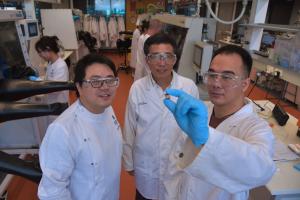Eco-friendly solar cells set new world record
Australian researchers have set a new world record efficiency for lead-free perovskite solar cells.
BRISBANE, QUEENSLAND, AUSTRALIA, April 17, 2025 /EINPresswire.com/ -- Researchers at The University of Queensland have set a new world record efficiency for lead-free perovskite solar cells, advancing the development of safer, more sustainable solar technologies.A team led by Professor Lianzhou Wang, based at the Australian Institute for Bioengineering and Nanotechnology (AIBN) and the School of Chemical Engineering, achieved a breakthrough certified efficiency of 16.65 per cent using tin-based perovskite - a non-toxic alternative to the lead typically used in next-generation solar cells.
“This is a major milestone for the field,” Professor Wang said.
“To achieve such a high efficiency with tin perovskites, a non-toxic material, demonstrates the potential to deliver solar technologies that are both high-performing and safer for people and the planet.”
Researchers began exploring perovskite materials as a cheaper, more efficient alternative to traditional silicon-based solar cells, with lead-based versions offering some of the strongest early results, achieving impressive efficiencies over 25 per cent.
Their reliance on toxic lead has raised serious concerns around environmental safety and disposal, prompting efforts to search for more eco-friendly alternatives.
“Lead-based perovskites have long delivered high efficiencies, but lead is highly toxic and can potentially cause severe environmental pollution,” Professor Wang said.
“Our results using tin shows that we can offer a safer path forward - without the need for lead and without significantly compromising performance.”
The tin-based solar cells build on the team’s previous world record using quantum dots, with the new eco-friendly material achieving energy efficiency one step closer to that of lead and silicon counterparts.
“Efficiency has always been the biggest hurdle with tin,” Professor Wang said.
“Now we’re narrowing that gap and opening the door to a new generation of solar technologies that are not only safer, but also more versatile.
“With further improvements, we could see flexible solar panels, indoor applications, and lightweight devices powered by our clean, lead-free energy – possibilities that aren’t fully achievable with lead-based materials.”
While the result represents a global benchmark, the team says further work is needed to optimise the technology for long-term use.
AIBN researcher Dr Peng Chen said the team’s breakthrough was made possible by carefully controlling how the tin material forms during fabrication.
“Tin is much less stable than lead as it reacts easily with oxygen and degrades, which reduces the cell’s performance and operational life,” Dr Chen said.
“By using a colloidal chemical strategy with caesium, we were able to control how the material forms and make better-quality tin solar films that allowed us to achieve our more efficient and durable tin-based cells.
“This record shows that we’re overcoming some of the key barriers of using tin, but further improvements in stability and efficiency will be key to unlocking its commercial use.”
The team – including AIBN researcher Dongxu He – will now focus on enhancing the durability of tin-based cells and refining production techniques to support scalable, real-world use including flexible panels and low-light-intensity indoor systems.
The research was supported by an ARC Laureate Fellowship, Discovery Project, and DECRA Fellowships, with additional contributions from the University of New South Wales and Australian National University.
The AIBN is the leading bioengineering and nanotechnology research institute in Australia with a team of more than 500 researchers from around the globe who translate the most cutting-edge science from lab bench to the production line. Our power lies in the diversity of our team, our members come from 30 different countries, more than 50 per cent are women and we have 160 PhD students and 120 postdoctoral researchers. https://aibn.uq.edu.au/
AIBN Communications
communications|aibn.uq.edu.au| |communications|aibn.uq.edu.au
Australian Institute for Bioengineering and Nanotechnology
Visit us on social media:
LinkedIn
Legal Disclaimer:
EIN Presswire provides this news content "as is" without warranty of any kind. We do not accept any responsibility or liability for the accuracy, content, images, videos, licenses, completeness, legality, or reliability of the information contained in this article. If you have any complaints or copyright issues related to this article, kindly contact the author above.
Dr. Duane L. Dillard selected for The Lifetime Achievement Award by IAOTP
USA Today Bestselling Author DC Gomez to give away 1 million copies of Award-Winning e-book from April 2025 - April 2026
Legends of War - Book 2: Sparrow Wars in the Garden of Bliss, Presented by Atticus Publishing
Kalendarium
Więcej ważnych informacji
 Jedynka Newserii
Jedynka Newserii

 Jedynka Newserii
Jedynka Newserii

Prawo

UE lepiej przygotowana na reagowanie na klęski żywiołowe. Od czasu powodzi w Polsce pojawiło się wiele usprawnień
Na tereny dotknięte ubiegłoroczną powodzią od rządu trafiło ponad 4 mld zł. Pierwsze formy wsparcia, w tym zasiłki, pomoc materialna czy wsparcie dla przedsiębiorców, pojawiły się już w pierwszych dniach od wystąpienia kataklizmu. Do Polski ma też trafić 5 mld euro z Funduszu Spójności UE na likwidację skutków powodzi. Doświadczenia ostatnich lat powodują, że UE jest coraz lepiej przygotowana, by elastycznie reagować na występujące klęski żywiołowe.
Prawo
Rzecznik MŚP: Obniżenie składki zdrowotnej to nie jest szczyt marzeń. Ideałem byłby powrót do tego, co było przed Polskim Ładem

Podczas najbliższego posiedzenia, które odbędzie się 23 i 24 kwietnia, Senat ma się zająć ustawą o świadczeniach opieki zdrowotnej finansowanych ze środków publicznych. Zakłada ona korzystne zmiany w składkach zdrowotnych płaconych przez przedsiębiorców. Rzecznik MŚP apeluje do izby wyższej i prezydenta o przyjęcie i podpisanie nowych przepisów. Pojawiają się jednak głosy, że uprzywilejowują one właścicieli firm względem pracowników, a ponadto nie podlegały uzgodnieniom, konsultacjom i opiniowaniu.
Handel
Konsumpcja jaj w Polsce rośnie. Przy zakupie Polacy zwracają uwagę na to, z jakiego chowu pochodzą

Zarówno spożycie, jak i produkcja jaj w Polsce notują wzrosty. Znacząca większość konsumentów przy zakupie jajek zwraca uwagę na to, czy pochodzą one z chowu klatkowego. Polska jest jednym z liderów w produkcji i eksporcie jajek w UE, ale ma też wśród nich największy udział kur w chowie klatkowym. Oczekiwania konsumentów przyczyniają się powoli do zmiany tych statystyk.
Partner serwisu
Szkolenia

Akademia Newserii
Akademia Newserii to projekt, w ramach którego najlepsi polscy dziennikarze biznesowi, giełdowi oraz lifestylowi, a także szkoleniowcy z wieloletnim doświadczeniem dzielą się swoją wiedzą nt. pracy z mediami.



![Dramatyczna sytuacja w opiece długoterminowej. Kolejki oczekujących są coraz dłuższe [DEPESZA]](https://www.newseria.pl/files/1097841585/opieka-nfz-still-1,w_85,_small.jpg)





.gif)

 |
| |
| |
|